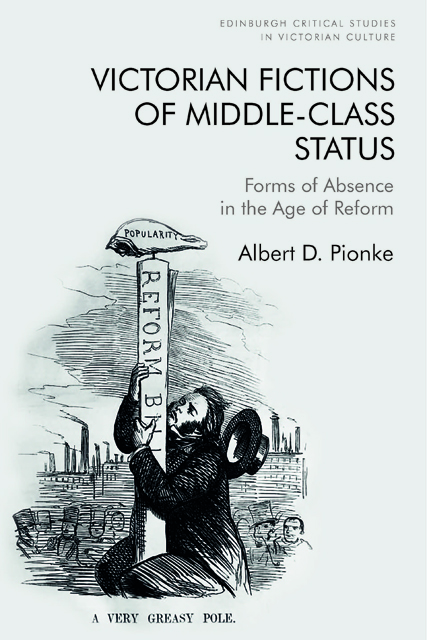Book contents
- Frontmatter
- Contents
- Acknowledgements
- Introduction: Victorian Middle-Class Status and the Negative Assertion of Value
- 1 The Orphan Narratives of a Class Lacking Antecedents
- 2 Repudiations of Wealth in Victorian Financial Fiction
- 3 The Violence at the Heart of the Social Problem Novel
- 4 Social Domination, Social Scientific Empiricism, and Novelistic Distrust of the Modern Fact
- 5 Legitimizing the Subjection of Middle-Class Women in Mid-Victorian Fiction
- Afterword
- Bibliography
- Index
4 - Social Domination, Social Scientific Empiricism, and Novelistic Distrust of the Modern Fact
Published online by Cambridge University Press: 25 April 2023
- Frontmatter
- Contents
- Acknowledgements
- Introduction: Victorian Middle-Class Status and the Negative Assertion of Value
- 1 The Orphan Narratives of a Class Lacking Antecedents
- 2 Repudiations of Wealth in Victorian Financial Fiction
- 3 The Violence at the Heart of the Social Problem Novel
- 4 Social Domination, Social Scientific Empiricism, and Novelistic Distrust of the Modern Fact
- 5 Legitimizing the Subjection of Middle-Class Women in Mid-Victorian Fiction
- Afterword
- Bibliography
- Index
Summary
Eliot was herself convinced by her friend and publisher, John Blackwood, to attempt to act the ameliorating social part of Esther and Felix immediately after the publication of Felix Holt and the passage of the Second Reform Act. Heartened by the broad public’s positive reception of what he perceived as the novel’s fundamentally conservative politics, Blackwood commissioned Eliot to resurrect her protagonist’s fictional voice for a nonfictional admonition to England’s newest voters. Written in late November and early December of 1867, the resulting “Address to Working Men, by Felix Holt” appeared in the January 1868 number of Blackwood’s Edinburgh Magazine. Deploying a corporeal metaphor popular among contemporary sociological thinkers, the “Address” advocates for “the care, the precaution, with which we should go about making things better, so that the public order may not be destroyed, so that no fatal shock may be given to this society of ours, this living body in which our lives are bound up.” That England’s numerical majority, however previously disenfranchised, has been unable or unwilling to cure the social body of “the bad practices, the commercial lying and swindling, the poisonous adulteration of goods, the retail cheating, and the political bribery which are carried on boldly in the midst of us,” is a sign, Eliot-cum-Felix asserts, that the nation’s new working-class electors may not yet possess “the knowledge, the foresight, the conscience, that will make [them] well-judging and scrupulous in the use of” the vote.
Without these qualities, and denied “by the very fact of our privations” the requisite exposure to Bourdieu’s aesthetic objects, these same constituents are likely to undervalue “that treasure of knowledge, science, poetry, refinement of thought, feeling, and manners, great memories and the interpretation of great records, which are carried on from the minds of one generation to the minds of another.” Warned away from the exercise of an aesthetic/moral disposition they do not possess, the supposed auditors of Felix’s “Address” are advised instead to gain the “practical” knowledge necessary to endure: “It is constantly the task of practical wisdom not to say, ‘This is good and I will have it,’ but to say, ‘This is the less of two unavoidable evils, and I will bear it.
- Type
- Chapter
- Information
- Victorian Fictions of Middle-Class StatusForms of Absence in the Age of Reform, pp. 136 - 172Publisher: Edinburgh University PressPrint publication year: 2022



